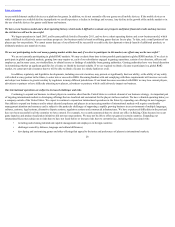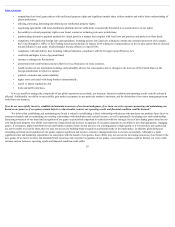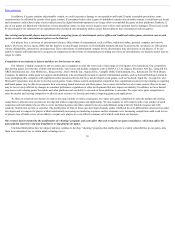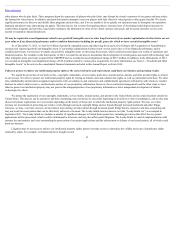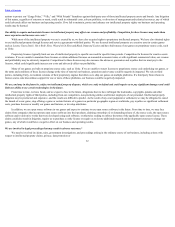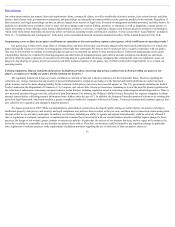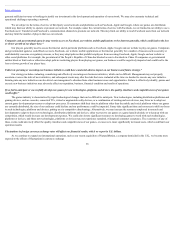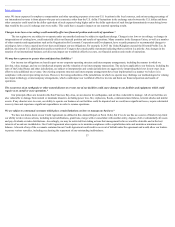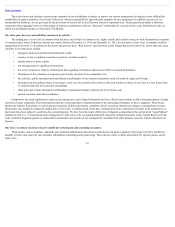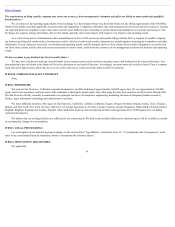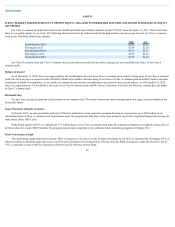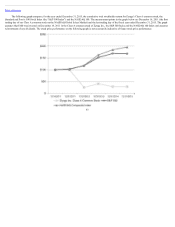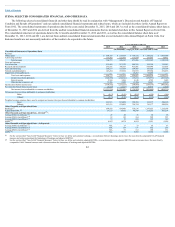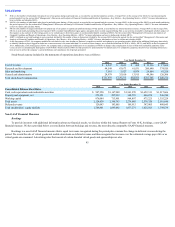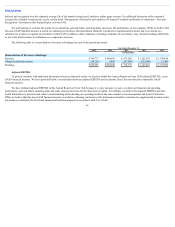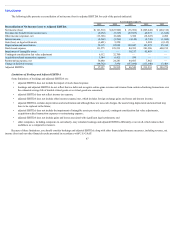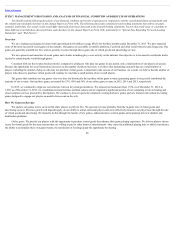Zynga 2015 Annual Report Download - page 41
Download and view the complete annual report
Please find page 41 of the 2015 Zynga annual report below. You can navigate through the pages in the report by either clicking on the pages listed below, or by using the keyword search tool below to find specific information within the annual report.
Table of Contents
Wemayrequireadditionalcapitaltomeetourfinancialobligationsandsupportbusinessgrowth,andthiscapitalmightnotbeavailableonacceptabletermsor
atall.
We intend to continue to make significant investments to support our business growth and may require additional funds to respond to business challenges,
including the need to develop new games and features or enhance our existing games, improve our operating infrastructure or acquire complementary businesses,
personnel and technologies. Accordingly, we may need to engage in equity or debt financings to secure additional funds. If we raise additional funds through future
issuances of equity or convertible debt securities, our existing stockholders could suffer significant dilution, and any new equity securities we issue could have
rights, preferences and privileges superior to those of holders of our Class A common stock. Any debt financing that we secure in the future could involve
restrictive covenants relating to our capital raising activities and other financial and operational matters, which may make it more difficult for us to obtain
additional capital and to pursue business opportunities, including potential acquisitions. We may not be able to obtain additional financing on terms favorable to us,
if at all. If we are unable to obtain adequate financing or financing on terms satisfactory to us when we require it, our ability to continue to support our business
growth and to respond to business challenges could be significantly impaired, and our business may be harmed.
Risks Related to Our Class A Common Stock
Thethreeclassstructureofourcommonstockhastheeffectofconcentratingvotingcontrolwiththosestockholderswhoheldourstockpriortoourinitial
publicoffering,includingourfounderandcertainotherexecutiveofficers,employeesanddirectorsandtheiraffiliates;thislimitsourotherstockholders’
abilitytoinfluencecorporatematters.*
Our Class C common stock has 70 votes per share, our Class B common stock has seven votes per share and our Class A common stock has one vote per
share. Mark Pincus, our Chief Executive Officer, beneficially owned approximately 63% of the total voting power of our outstanding capital stock as of
December 31, 2015. As a result, Mr. Pincus has significant influence over the management and affairs of the Company and control over matters requiring
stockholder approval, including the election of directors and significant corporate transactions, such as a merger or other sale of our Company or our assets.
Mr. Pincus may hold this voting power for the foreseeable future, subject to additional issuances of stock by the Company or sales by Mr. Pincus. This
concentrated voting control limits the ability of our other stockholders to influence corporate matters and could adversely affect the market price of our Class A
common stock.
Future transfers or sales by holders of Class B common stock or Class C common stock will result in those shares converting to Class A common stock,
which will have the effect, over time, of increasing the relative voting power of those stockholders who retain their existing shares of Class B or Class C common
stock. In addition, as shares of Class B common stock are transferred or sold and converted to Class A common stock, the sole holder of Class C common stock,
Mark Pincus, will have greater relative voting control to the extent he retains his existing shares of Class C common stock, and as a result he could in the future
continue to control a majority of our total voting power. Mark Pincus is entitled to vote his shares in his own interests and may do so.
CertainprovisionsinourcharterdocumentsandunderDelawarelawcouldlimitattemptsbyourstockholderstoreplaceorremoveourboardofdirectorsor
currentmanagementandlimitthemarketpriceofourClassAcommonstock.
Provisions in our certificate of incorporation and bylaws may have the effect of delaying or preventing changes in our board of directors or management. Our
certificate of incorporation and bylaws include provisions that:
• establish an advance notice procedure for stockholder proposals to be brought before an annual meeting, including proposed nominations of persons
for election to our board of directors;
• prohibit cumulative voting in the election of directors; and
• reflect three classes of common stock, as discussed above.
38


